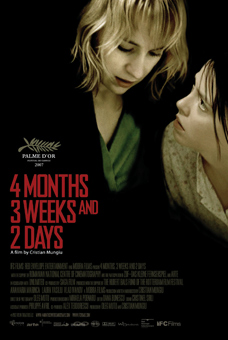Here’s another recommendation from the 2007 vault. This film, 4 Months, 3 Weeks and 2 Days, is a very different sort to the last one I wrote about on Culch.ie. RTE recently broadcast it in a late-night slot (23 September), and although I didn’t re-watch it then, I got to thinking about it again – hence this post. Unlike many films that pass through my eyes and soon fade from my mind, Cristian Mungiu’s bleak and disturbing film has stayed strong in my memory.
4 Months, 3 Weeks and 2 Days shows a day in the lives of two young women in Romania in 1987. It is near the end of Ceauşescu’s totalitarian rule; ID checks are frequent, depersonalisation is rife, and bureaucracy’s knots are knitted everywhere. The film’s main character, Otilia (played brilliantly by Anamaria Marinca, pictured in blue, below), has held her humanity and decency, but she suffers for it – simply through her connection to the wrong person in the wrong circumstances. By feeling honour-bound to do the right thing for her roommate Gabita, who lives her life with an almost criminal self-absorption, Otilia is drawn inexorably into a sequence of appalling events.

Fictional trauma is harder to ignore when we see so clearly the souls that suffer it, and rarely are the tragic consequences of carelessness so forcefully shown. The acting in 4 Months… is extraordinary, the actors’ bravery astonishing. Their performances come to life and cast a spell on the viewer, reinforced by cinematographer Oleg Mutu’s long, fixed takes that allow scenes to unfold at a realistic pace. It’s a far cry from the hyperkinetic editing now routine in so many films, a style not without its virtues but which tends to mask flaws, disorient viewers and undermine performers’ natural rhythms. Mutu also shot the art-house hit The Death of Mister Lazarescu, a similar film in many ways.
To draw another comparison, Michael Haneke also uses long and static takes in his films, but his love of provocation sometimes shoulders aside his storytelling instinct, and he has a habit of overstating his points. On the evidence of 4 Months…, Mungiu’s tactics are less contrary, his insights more deftly communicated. The anger in this film never gets in the way of the story. Although Mungiu’s direction allows room for his characters to breathe, it also confers an intensely claustrophobic pressure on the drama. Some events or parts of events happen off-screen, adding to the viewer’s anxiety. The sense of dread is almost unbearable at times. Another striking aspect of the film is its framing: we sometimes see only part of the characters’ bodies: a hand, for example, or a torso. This technique is used in the very first scene, signalling an interest in the disconnections in people’s relationships with each other and with their own bodies. It also foreshadows the film’s main event, but I’ll say no more about that.
 Belying the film’s methodical rigour is an apparent looseness in what occurs on screen, a haphazardness that adds greatly to the realism. One of the reasons suspense is maintained is because no predictable formula is being followed. There is also a vein of the blackest humour, made more explicit in the end credits where the film is described as the first in a series of “Tales From The Golden Age”. This bristling irony is very evident towards the end of the film, in an amazing dinner-table scene that is worthy of Bunuel.
Belying the film’s methodical rigour is an apparent looseness in what occurs on screen, a haphazardness that adds greatly to the realism. One of the reasons suspense is maintained is because no predictable formula is being followed. There is also a vein of the blackest humour, made more explicit in the end credits where the film is described as the first in a series of “Tales From The Golden Age”. This bristling irony is very evident towards the end of the film, in an amazing dinner-table scene that is worthy of Bunuel.
To tell a story is a very natural and simple thing to do; to tell it well is a bit more difficult. 4 Months, 3 Weeks and 2 Days tells its story so well that you don’t want to miss a moment of it, even when you can hardly bear to watch. It operates effectively on several levels but never strays from its intimate core. Its politics are implicit: it studies the human fallout of oppression and irresponsibility, the effects of which show plainly on Otilia’s face. When the film is over you’re left harrowed and dumbstruck. (That, at least, was my experience.) It won’t be to everyone’s taste, and whatever your taste it won’t cheer you up. But if you miss it, you’re missing out on one of the best films of recent years.
Despite wowing the critics and winning a plethora of international awards (including the Palme d’Or at Cannes, though it was absurdly overlooked for an Oscar nomination), I would guess that for every one person who has seen 4 Months, 3 Weeks and 2 Days, hundreds if not thousands have sat through Transformers 2. (I have nothing against Hollywood films except when they’re rubbish; for the record, I haven’t seen Transformers 2.) Make no mistake: 4 Months… is not a Friday-night crowd-pleaser. In many ways it is the antithesis of a Hollywood blockbuster. It doesn’t even have a musical soundtrack. It is, however, unforgettable, and it deserves a wide audience.
[Official site, with trailer and more.]







I had the wonderful opportunity to catch this film at Cannes two years ago. The buzz around the festival was amazing and the film more than matched it. An incredible and harrowing piece of cinema.
Niall: I’ve never been to Cannes, but I imagine that it was a great place to see 4M3W&2D (or any film, for that matter). Glad to hear that it went down well there.
Sounds very good, had not heard of the film..
Keleher: It is very good. Demands patience and a strong stomach, though.